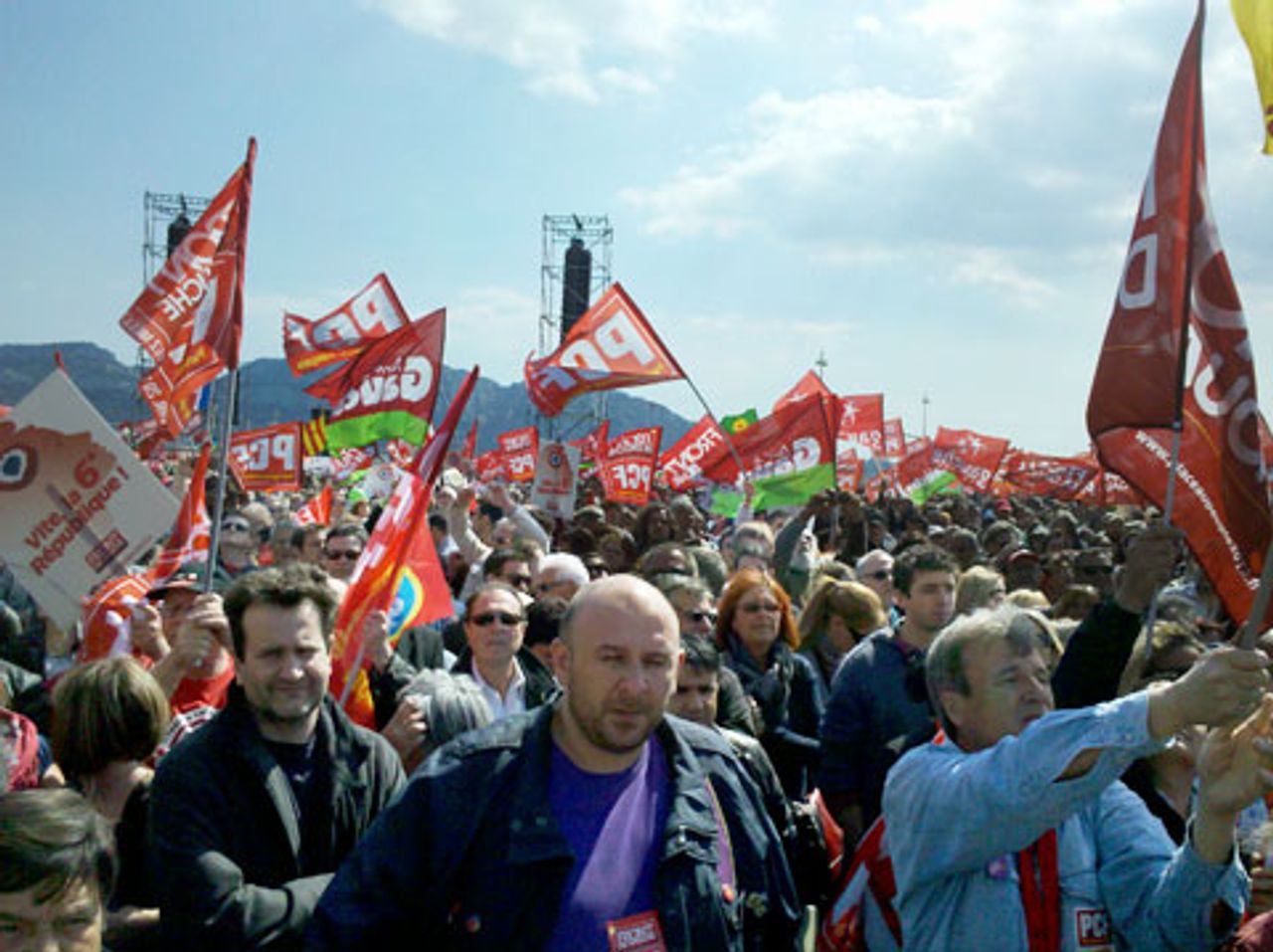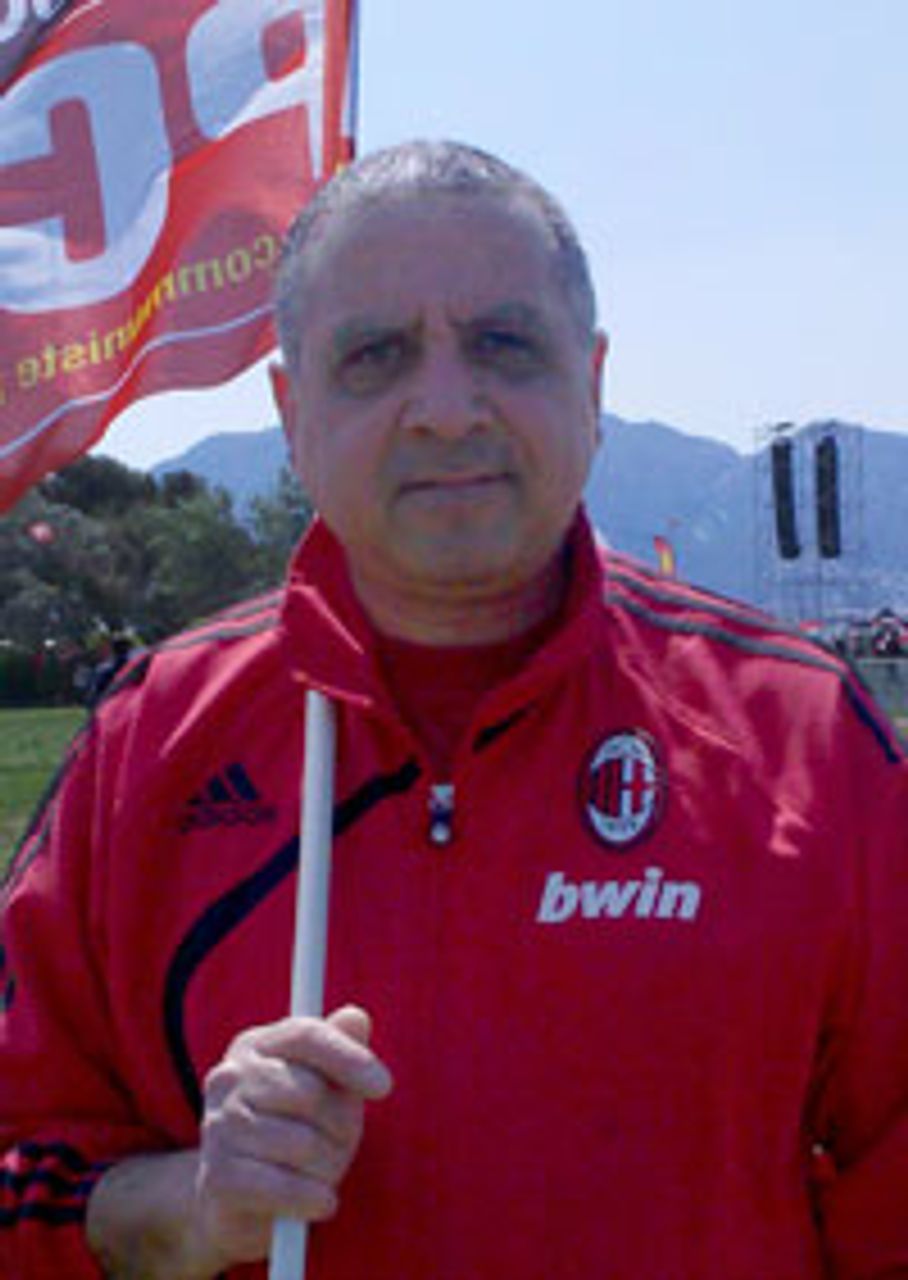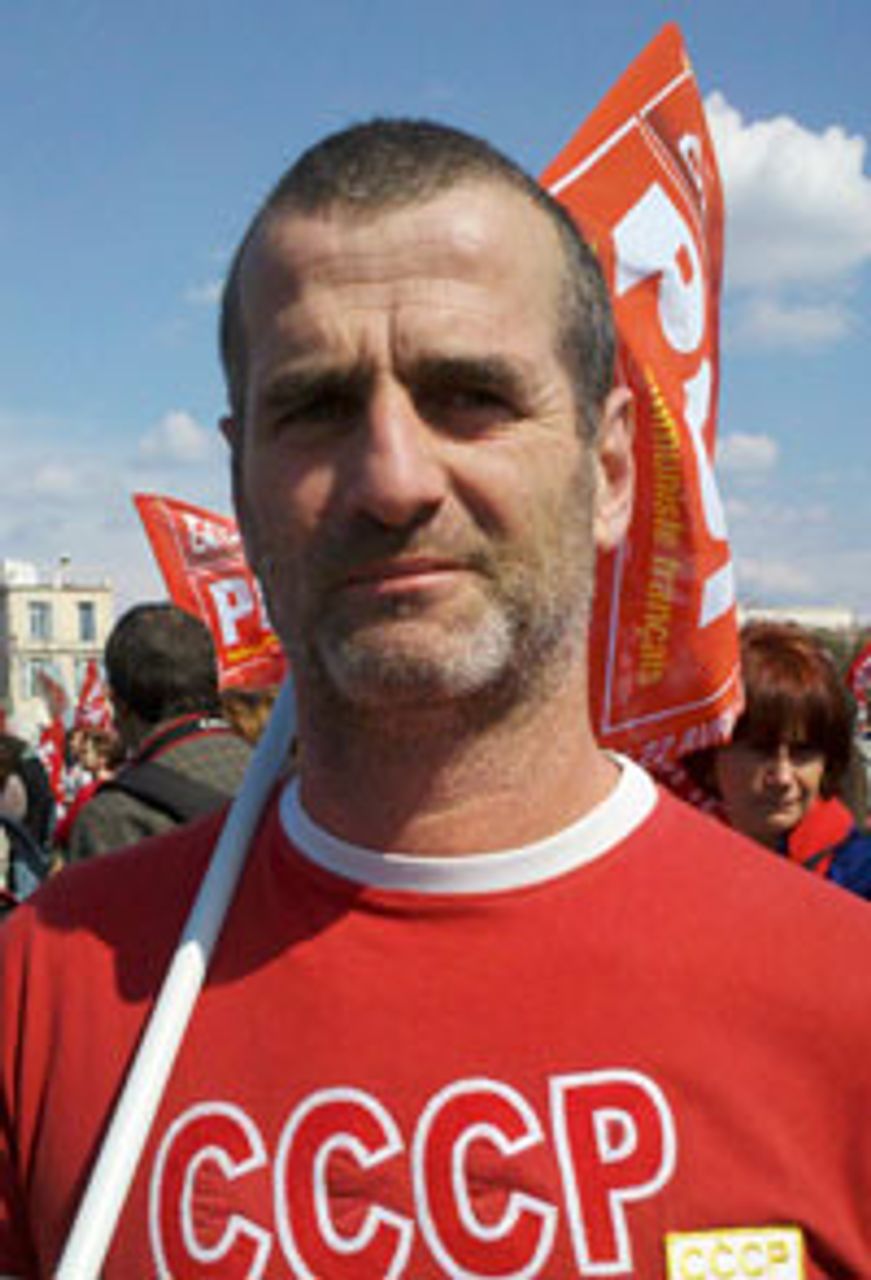 The demonstration in Marseille
The demonstration in MarseilleTens of thousands of people marched down Marseille’s Prado Avenue on Saturday to attend the election rally of Jean-Luc Mélenchon, the Left Front’s presidential candidate. This was the third rally, after events in Paris and Toulouse, for a candidate who is forecast to come in third in the April 22 vote, after incumbent President Nicolas Sarkozy and Socialist Party (PS) candidate François Hollande.
Attendance at the Marseille rally reflects widespread demands for a left-wing policy against the banks, and hopes aroused by Mélenchon’s election program—which calls for raising the minimum wage, widening access to health care and limiting social inequality.
One great contradiction underlay the rally, however: these demands are being placed on the Left Front, which is composed of forces incapable of serious opposition to the political establishment, because they are part of it. The front comprises the Left Party and its leader, Mélenchon, an ex-minister in the PS-led Plural Left government (2000-02), and the Stalinist French Communist Party (PCF). The PS, the PCF and their allies have long records, when they were in government in the 1980s and 1990s, of carrying out austerity policies demanded by the ruling elite. The fact that popular hopes for social and political change rest with such discredited forces indicates the vacuum on the left in France.
Mélenchon began his speech Saturday by referring to the Mediterranean and to last year’s revolutions in Egypt and Tunisia, calling for cancelling Tunisia’s debt: “We see the direction taken by the movement of the people. We must lighten the load on these people, particularly our brothers and sisters in Tunisia.” He criticized the US military presence in the Mediterranean, which he said should be a “zone of peace,” and denounced attempts to divide the population along religious lines: “Shut up already about religion, about all religions.”
He continued, “We are writing a page in the history of the left, the left that does not betray.” He pledged to defend “those who are scorned, ignored, insulted. We’ve had enough of hearing that we are moochers. The only people who are moochers in this country are the rich.” He praised the working class as “the class of the common [national] interest, the patriotic class,” and also as an “ecological” class.
Citing the creation on the German stock exchange of financial instruments to speculate against French sovereign debt, he warned: “Finance will attack after April 16 [when Eurex, a subsidiary of the German stock market, will launch a new futures contract on French government bonds], and France will not give in.” He asked his supporters to respond to union calls for protest strikes, calling on them to be “cultivated” and “a disciplined force in struggle.” He closed with, “Long live the Republic, long live France!”
Mélenchon’s perspective has proven to be a dead end time and again for the European working class in its struggle against the dictatorship of finance capital. The policy he outlined—that workers should follow the union bureaucracies in limited protest strikes to influence state policy—has been the line of the Stalinist and petty-bourgeois “left” parties under social-democratic governments in Greece, Spain and Portugal targeted by the banks. These governments moved ahead with austerity policies, ignoring popular protests and impoverishing workers in those countries.
The nationalism and patriotism promoted by Mélenchon, despite its “left” coating, expresses social interests entirely alien and hostile to the working class. He was careful to hide the chauvinist and imperialist implications of his nationalist views, such as his support for France’s participation in the Libyan war or the PCF’s role in proposing legislation to ban the burqa. This is why Mélenchon could not explain in any detail the difference between his politics and those of the “left” politicians, in the Socialist Party and Communist Party, whom he implicitly admitted had betrayed the working class. Mélenchon’s politics are in fact largely the same as theirs, and have nothing to do with the revolutionary struggle that would be necessary to win decent jobs and living conditions and basic rights against crisis-ridden French capitalism.
 Farid
FaridWSWS reporters at the rally spoke to Farid, a technician at a Marseille-area hospital and member of the PCF’s security team. He said he hoped Mélenchon would get “a good score in the presidential elections, to have an impact on political issues and change the debate… If Hollande is elected it will not be like in Greece; Hollande will be well controlled by the left.”
He said that Sarkozy’s Social Security reforms, allowing doctors to charge patients at each consultation, had created “inequality, with substantial portions of the population denied access to care.” He also pointed to the loss of thousands of industrial jobs in Marseille with the closure of the Lafarge cement factory, Kuhlmann petrochemical plants and shipbuilding facilities. He said, “We need banks in the service of the nation…part of the banking system must be for industry, and part of it for finance pure and simple.”
Asked if he thought there should be a workers state, like what emerged in the USSR from the October Revolution, Farid responded: “We do not want a workers state, but to govern with the people… We want this ideal in the service of the people.”
Etienne, a student, said he agreed with “virtually everything” in Mélenchon’s program, adding that he hoped the Left Party politician would influence a Hollande presidency: “Even if he does not win, he will have influence on Hollande’s program.” He cited Hollande’s proposal to tax yearly income above 1 million euros at 75 percent as an example of Mélenchon’s influence on the PS.
Asked if he thought Mélenchon would actually influence Hollande’s policy in government, he said, “It’s hard to say.” Noting that he was young when Mélenchon was part of PS President François Mitterrand’s political team, Etienne added that he hoped Mélenchon “has corrected his conduct since.”
The WSWS also spoke to Jean-Marc, who works in the Arsenal works repairing French fighter jets and is a PCF sympathizer. He said he was attending the rally “to defend our politics, the distribution of wealth, pensions and public services.” He wanted “a change against the entire Europe of finance, which will put us out on the street like they did in Greece.”
 Jean-Marc
Jean-MarcWhen asked about France’s participation in the Libyan war, which Mélenchon had supported, Jean-Marc said: “I did not like it. We are there to defend ourselves, not to make war, and France was not attacked. I am closer to the PCF than to the Left Front, to try to beat capitalism. … But I don’t approve of what the Stalinist regimes did, it was not communist and it was not what Marx had described, there were huge errors.”
WSWS reporters noted that there was a profound difference between the nationalism of the Stalinist bureaucracy and the revolutionary internationalist policies advocated by Leon Trotsky and the Fourth International. In perhaps the most notable struggle in France in the 20th century, this Stalinist line led PCF chairman Maurice Thorez to oppose continuing the 1936 general strike against the Popular Front government of the social democrat Léon Blum, advocating national unity instead.
Jean-Marc replied that Thorez was seeking to prepare France’s national defense against the Nazis before the beginning of World War II. He continued, “I defend the social gains of the National Council of the Resistance, paid holidays [obtained as a concession in exchange for ending the 1936 general strike], this was thanks to the PCF. There was a big difference between Stalin and Trotsky. I am not Trotskyist, but I am not a Stalinist.”
Asked what he thought the dissolution of the USSR in 1991 had meant for the working class in France, he said: “Since the 1980s conditions have continued to degenerate. In the last 15 years in particular, things have gone from bad to worse, with the issue of paying for medicine, and the introduction of the euro, it can be hard to do all your shopping.”
WSWS reporters noted that by distancing himself from the Left Front, he was showing that he did not entirely trust Mélenchon. Jean-Marc responded, “Mélenchon was a PS minister, that’s why. Hollande is even further to the right, he will change nothing… I hope that Mélenchon will stay on his current political line.”
The author also recommends:
What are the politics of French Left Front candidate Jean-Luc Mélenchon?
[10 April 2012]
French Socialist Party presidential candidate issues bogus pledge to tax the rich
[29 February 2012]
A tool of imperialism: France’s New Anti-Capitalist Party backs war on Libya
[25 March 2011]
